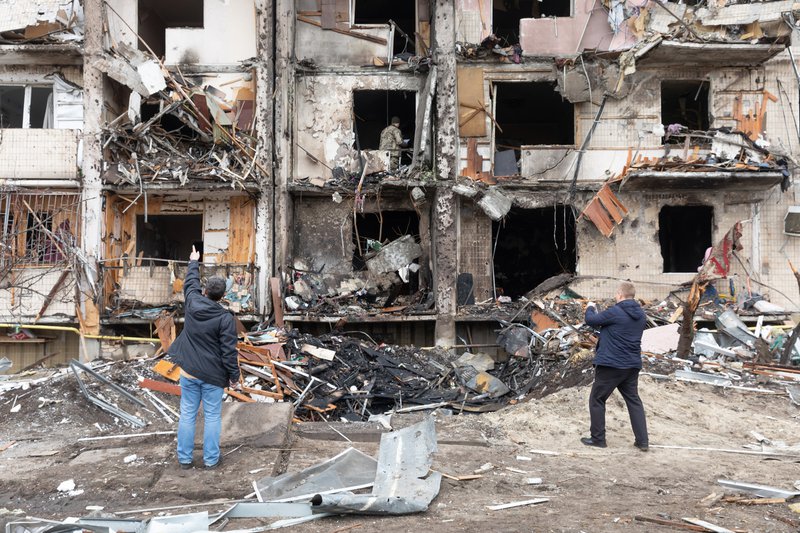We Need to be Talking About Ukrainian Property Claims Right Now.
Blog Post

Drop of Light / Shutterstock.com
April 13, 2022
Since Russia’s invasion of Ukraine in late February, more than 4.6 million people have fled the country and another 7.1 million are displaced internally. Nearly 25 percent of the total population have left behind their homes, livelihoods, and assets.
The Russian Army continues to level Eastern and Southern cities such as Kharhkiv and Mariupol, resulting in shocking accounts of death in the streets and bombed-out neighborhoods. Ukrainian armed forces persist in the defense of their homeland, however, and the recent Russian withdrawal from Kyiv's outskirts is a striking example of their battlefield success. It’s unlikely that the war will be over any time soon, with both armies regrouping significant forces around the eastern Donbas region.
Despite the uncertain future, it’s not too soon to start talking about the rebuilding process in Ukraine. (There’s already reports, for instance, that Ukrainian refugees are returning to Kyiv.)
Post-war restitution and rebuilding are messy processes, and issues surrounding property rights are common. That’s because as families and individuals flee war, they abandon homes, land, and valuable personal property like cars and machinery. Some households plan in advance to sell or rent their property, or perhaps pack ever-valuable ownership documents. But more commonly, a sudden descent into chaos leaves people days or hours to gather belongings and go, leaving most everything behind. The shock and disbelief across Ukraine following Russia’s early morning invasion on February 24th suggests that many fled without property ownership documents or finding anyone to look after their house, shop, or farm.
But the day will come for millions of Ukrainians to return and rebuild, and they will need to reclaim homes still standing, whether abandoned or stolen, or receive compensation for properties reduced to rubble. The restitution process will inevitably lead to some very tough choices: How will decisions be made? Who will pay for destroyed property? How will the government decide who has what rights to which resources? And, equally important, where will people live while the country rebuilds?
The United Nations views the return of homes, land, and other property as a critical component of peacebuilding and reconciliation. There’s an international set of rules called the “Pinheiro Principles” for the eventual recovery of possessions that war refugees leave behind, which establish that it’s a government’s duty to restore stolen property, or to provide compensation if it’s destroyed in war.
Practically speaking, post-conflict property restoration usually involves the UN and partner organizations working with a government to set up a land commission and establish a mass claims process. This work often spans decades, because of the sheer number of claims and the difficulty of proving ownership. To help speed things up, the Pinheiro Principles allow countries to accept a wide range of evidence regarding property ownership. In the absence of a deed or a title, an individual or household can provide tax receipts, utility bills, or neighbors’ testimonies to prove where they lived, and increase their chances of restoration or compensation.
Relative to global standards, research groups and international organizations rate the housing, land, and property rights regime in Ukraine as mediocre. Both its strengths and weaknesses will impact the large-scale restoration of private property.
The Ukrainian state owned almost all land, homes, and businesses before 1991, but the government has undergone systematic land reform since the dissolution of the Soviet Union, privatizing ownership of both rural and urban property. According to Prindex, a global survey on tenure security published in 2020, only ten percent of Ukrainians felt “property insecure” pre-invasion, and nearly 90 percent possessed formal ownership documents. If records aren’t destroyed or lost, widespread documentation can hopefully help to accelerate mass claim processes.
At the same time, land governance in Ukraine has been criticized for its slow pace of reforms, its limited constitutional rights for property owners, and for its pervasive corruption and inefficiencies. Perhaps most disparaged was a 20-year freeze on the sale of private farmland. The privatization of non-agricultural property has been less problematic, and it’s more easily sold, although records created in the early 2000s sometimes include unreliable and contradictory information.
What else can refugees expect when they start to rebuild their country? If we look at past experiences, two problems quickly emerge.
First, there might not be any formal record of property ownership available to use in a post-war claim. Titles and deeds in many countries aren’t officially stored, centralized, or even backed up. Sometimes, a government’s paper or digital files are destroyed during the course of a conflict. That means owners have the only copy, and if they fled hurriedly or misplaced their document, no other record exists.
Second, abandoned homes and land are often occupied by squatters from an opposing ethnic or political group. The Ukrainian Government and aid organizations are already well-acquainted with this problem, as secondary occupation of property has been reported in Crimea, occupied by Russia since 2014, as well as in the Donetsk and Luhansk oblasts, regions that have experienced nearly a decade of Russian-backed armed separatism. These occupations can drastically complicate reclamation processes.
While it might be years before Ukrainians can reclaim their property, there are measures that policymakers can put in place right now to increase chances of a successful post-war restitution effort. And there are also innovative ways that refugees can document their property ownership and improve their odds of reclaiming all they left behind.
We’ll be discussing these issues and more at next Thursday’s event on displaced Ukrainians' property rights, in partnership with the Norwegian Refugee Council. The work can’t start soon enough.
Register here for the April 21st event, “Millions of Ukrainians Have Fled. What Happens to Their Property?”